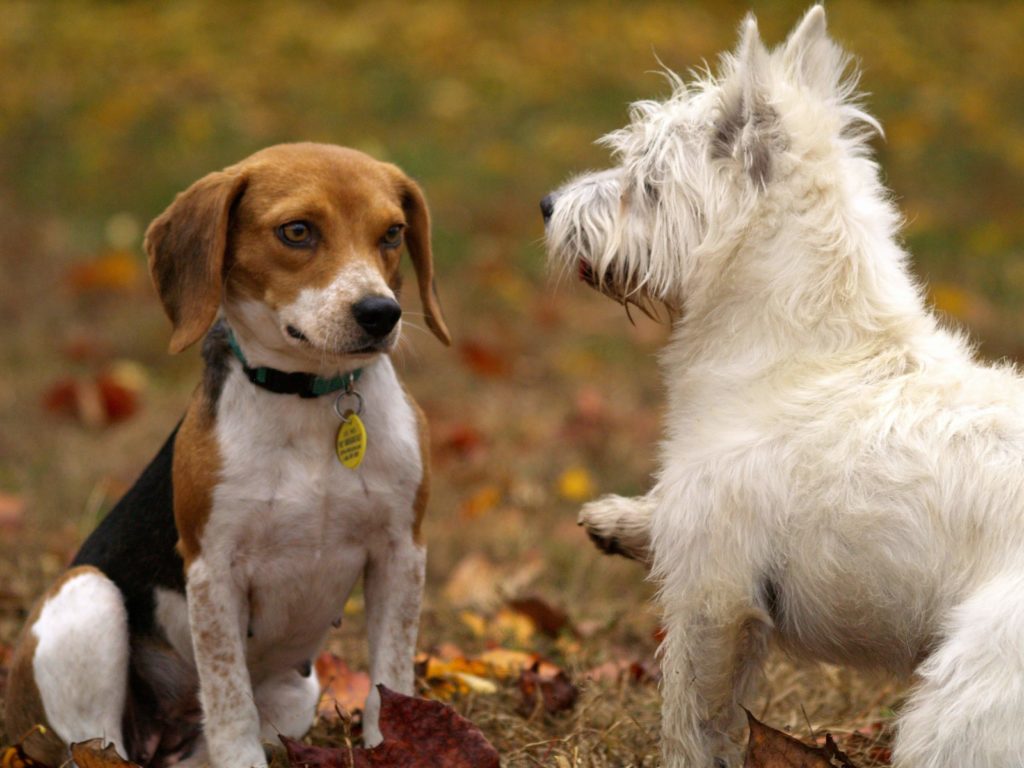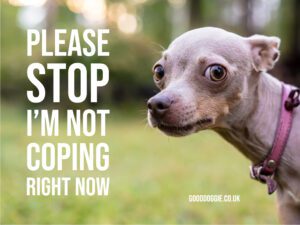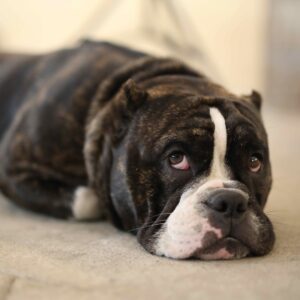Did you know about my FREE support group for Reactive Dog Behaviour?
Three Years On: The impact lockdown had on our dogs confidence and socialisation skills
Lockdown didn’t just affect us, it also impacted the way our dogs socialise, and for some the effect has been profound. Our older dogs have coped pretty well, but those born during lockdown have felt the impact the most. In this blog I am going to talk about the impact lockdown had on our dogs confidence and socialisation skills.
So what went wrong?
At the start of lockdown the message was clear. Covid could be anywhere, so keep your distance from everyone and everything, and stop touching stuff!
Previously we’d been happy to stop and chat to other people, and we loved watching our dogs play together and make new friends, dog and human. All of a sudden that was flipped on it’s head. Not only did we stop talking, we actively avoided others. We kept our dogs on their leads, put our heads down, and just walked. And if our dogs did approach someone, we quickly called them away.
The change was stark and, for our dogs, the only explanation was that other people and dogs must be bad. They didn’t understand R-rates or social distancing. All they knew was that we were suddenly avoiding everyone else, and we were super anxious about it. They might not understand pandemics but they are experts at picking up our anxiety and interpreting our behaviour.
Many dogs don’t socialise well on leads at the best of times, so they were already on edge. The combined result was a bunch of dogs trapped on their leads, yelling at each other as we dragged them to a safe distance. This new environment was stressful for everyone, and that has had a lasting impact on their behaviour.

What about at home?
We were allowed to go out during lockdown for exercise, so our dogs still got to see other dogs, at least. The house was a different story altogether. Where once we would have expected regular visitors, we now had none. Delivery people were being weird, our kids stopped having friends over, and we started shouting at people through the window instead of inviting them in!
Many of us also started noisily celebrating the efforts of our frontline services on a Thursday night – remember that! How do you think our dogs interpreted this behaviour? Combine that with our new habit of shouting through the letter box or out the window?
It is easy to see why our dogs thought the world outside was a dangerous place. We were now demonstrating extremely defensive behaviour at our boundaries! Our homes had become a closed environment that was only for our family, and this went on for a really long time. These dogs just never became used to sharing their space with other people.
A new normal
These experiences were used to create your dogs sense of “normal”.
Socialisation is all about learning what’s normal and what isn’t. Our older dogs weren’t so affected because their normal was already well established before lockdown. For them, lockdown felt weird, but they never forgot what it was like before. As we went back to how things were, the confident, older dog, bounced back to old habits and all was well.
Our younger dogs knew no different. In fact, for them, having dogs from other packs over for “coffee” is just plain weird. Their normal makes perfect sense, but are now being asked to change their normal quite dramatically and to something quite unnatural. For some this is exciting, but for many, it is very frightening. In either case, as we eased into new routines, it’s perfectly fair to expect some unusual new behaviours.
A golden opportunity
Lockdown also offered a golden opportunity to many families that previously couldn’t have a dog. Suddenly spending more time at home, and having more time in general, opened up a realm of possibilities. And so a staggering 3.2 million new dog homes were created in the UK. As breeders scrambled to keep up, prices surged, and anyone and everyone was breeding pups. This was heaven for a backyard puppy farmer, of course! In the rush to produce more pups, less care was taken when choosing potential parents, and a new generation of anxious pups was born.
Class Cancelled!!
But, these new families were new to puppy ownership. Nothing wrong with that, except for the fact that there was very little support available. Trainers and behaviourists were furloughed, although some offered online help. But so also did unqualified people trying to make a quick buck. So all those poor families were left to figure it out as they went, whilst missing out on the most vital element of bringing up puppy – socialisation!
This lack of early support led to a sudden rise in the use of punishment based techniques. In fact, the Royal Veterinary College’s research suggests that as many as 82% of pandemic puppy owners have tried aversive training techniques, and 39% tried aversive training aids. Aversive methods may sometimes be effective in changing behaviour, the side effect is that they destroy resilience and confidence. This just made things worse!
Home alone
Additional to that, all these new pups got used to having company all day. Houses were busy and they soon got used to that stimulation too. According to the kennel club, only 52% of new puppy owners thought about how they might look after their puppy after lockdown. So one day, we actually had to leave them on their own. Pups with already low resilience and anxiety, are particularly vulnerable to separation problems. And now we have the highest numbers of reported cases of separation anxiety.
So what next?
The first thing to realise is that whatever your dog is doing, it isn’t wrong, or bad. And it isn’t your fault either! It’s the best they can do under extremely unusual circumstances, and there was absolutely no way you could have stopped it.
Once you accept that your dog is doing his best, you can stop telling him off and focus on new behaviours instead. Don’t worry about what he is doing, it’s time to start thinking about what you’d like him to do instead. This is about changing behaviour, not what’s good or bad.
It’s so easy to obsess over stopping the unwanted behaviour, but when you do this your interactions can become quite negative, and your training lacks a goal. You’ll need a goal otherwise you’ll flounder. Keeping it positive also helps boost confidence. No one ever made an anxious dog feel better by shouting at them.
Never too late
And, if it feels like you are starting from scratch, then that’s ok. Teaching an older dog a new behaviour is never easy. It can be frustrating, and it takes patience. But it absolutely can be done.
I imagine we’ll be reeling from the effects of lockdown for a long while to come yet. In fact, it could continue long after the lockdown dogs have sadly left us. Reactive behaviour is at an all time high, and this will have a knock on effect on young pups heading out to socialise for the first time. These pups will be figuring out their normal. If they encounter enough reactive behaviour in the park, that will effect their own behaviour in the future.
Get help
According to a recent survey by the Royal Veterinary Collage, 1 in 5 pandemic puppy owners reports 8 behaviour problems in their, now adult, dog from a list including things like lead pulling and recall problems, separation anxiety, food guarding, fear related behaviours, and aggression to other dogs/strangers. So, if you are still struggling, you are not alone.
A professional dog behaviourist will fast track you through the rehabilitation process. They’ll understand the impact lockdown had on our dogs socialisation skills, and be able to see what types of training will work best for you and your dog. Plus, they’ll support you when it gets tough.
Other possibilities might include medication to help lessen the effects. Or, you maybe feel like this isn’t the right time for training and would rather look into day care or a pet sitter. These strategies are valid, however unless you are working on the problem it will always be there in the background. It might also contribute to a general lack of confidence and impact your dogs behaviour in other scenarios, so please don’t put it off for too long.
How can I help you with your dogs behaviour?
If you would like help solving your dogs behaviour and training, then please get in touch! Private Dog Behaviour Consultations are currently available in and around the Dundee area, and as far as Carnoustie, Broughty Ferry, Monifieth, Tayport, Newport, and Longforgan. Online coaching is also available if you are further afield!


